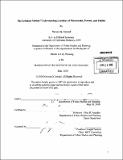| dc.contributor.advisor | Alice H. Amsden. | en_US |
| dc.contributor.author | Jawaid, Naveen Q. (Naveen Qamar) | en_US |
| dc.contributor.other | Massachusetts Institute of Technology. Dept. of Urban Studies and Planning. | en_US |
| dc.coverage.spatial | a-le--- | en_US |
| dc.date.accessioned | 2010-10-29T18:29:22Z | |
| dc.date.available | 2010-10-29T18:29:22Z | |
| dc.date.copyright | 2010 | en_US |
| dc.date.issued | 2010 | en_US |
| dc.identifier.uri | http://hdl.handle.net/1721.1/59745 | |
| dc.description | Thesis (M.C.P.)--Massachusetts Institute of Technology, Dept. of Urban Studies and Planning, 2010. | en_US |
| dc.description | Cataloged from PDF version of thesis. | en_US |
| dc.description | Includes bibliographical references (p. 110-115). | en_US |
| dc.description.abstract | The widespread popularity of microfinance as a "win-win" solution to global poverty alleviation has significantly limited debate and dialogue around contesting viewpoints, program structures, and implementation norms. The present microcredit industry in Lebanon offers an authoritative space for practitioners to explore a differing microcredit model as implemented by a Hezbollah affiliated NGO, Al Qard Al Hassan Association. As one of the oldest and largest microcredit institutions in the Middle East, I argue that the perceived Lebanese schism allows us to explore the role in which organizational diversity has enabled a reinterpretation and an opportunity to revisit microcredit as a poverty alleviation tool in the context of the Southern Suburbs of Beirut. The country of Lebanon also offers a new locality in which development planners can explore how an NGO grassroots program, Al Majmoua, and how an institution, Hezbollah, that began as a grassroots political movement for the community and is now in many ways of the state, implement successful microcredit programs. Through the lens of Lebanese microcredit professionals and borrowers of the programs, this study explores how a hybrid narrative of microcredit has escaped industry isomorphism in Lebanon and how social capital has been created, managed, and reproduced. | en_US |
| dc.description.statementofresponsibility | by Naveen Q. Jawaid. | en_US |
| dc.format.extent | 115 p. | en_US |
| dc.language.iso | eng | en_US |
| dc.publisher | Massachusetts Institute of Technology | en_US |
| dc.rights | M.I.T. theses are protected by
copyright. They may be viewed from this source for any purpose, but
reproduction or distribution in any format is prohibited without written
permission. See provided URL for inquiries about permission. | en_US |
| dc.rights.uri | http://dspace.mit.edu/handle/1721.1/7582 | en_US |
| dc.subject | Urban Studies and Planning. | en_US |
| dc.title | The Lebanese schism? : understanding localities of microcredit, poverty, and politics | en_US |
| dc.title.alternative | Understanding localities of microcredit, poverty, and politics | en_US |
| dc.type | Thesis | en_US |
| dc.description.degree | M.C.P. | en_US |
| dc.contributor.department | Massachusetts Institute of Technology. Department of Urban Studies and Planning | |
| dc.identifier.oclc | 670430313 | en_US |
